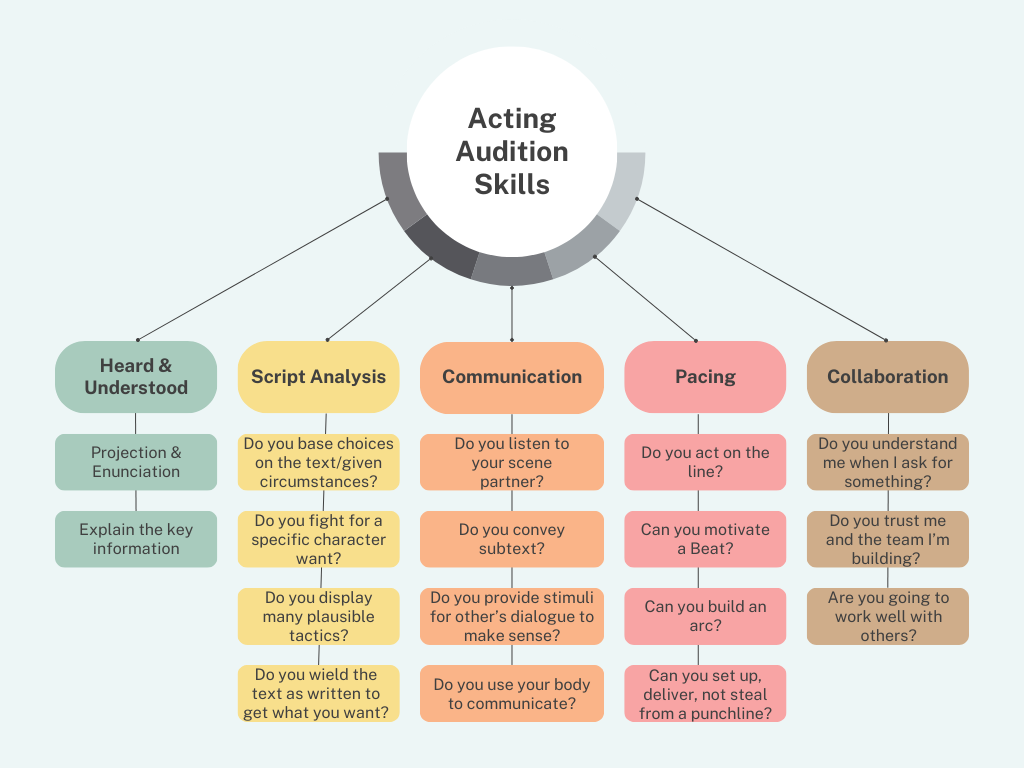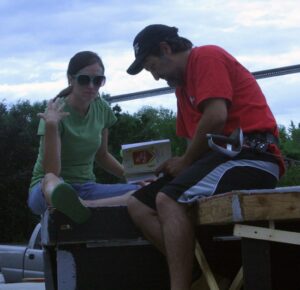
Most of the casting I do is for musical theatre, so I’m going to break down talent skills into the three musical theatre categories of: acting, singing, and dancing. A lot of these ideas use vocabulary or catchphrases from experts in my industry. These notions and articulations owe heritage to Michael Shurtleff, Anne Bogart, Stella Adler, Sanford Meisner, and others.
It really depends on the needs of the show and the specific role for me to tell you which set of skills is most important in what I’m looking for: singing, dancing, or acting. But I am biased in favor of acting. This is why I go see musical theatre instead of dance or singing concerts. Convincing acting can compensate for a lot of things in my opinion. But what does convincing acting consist of?
Creating this breakdown was harder for me than creating the singing and dancing ones. Maybe it’s because acting is my favorite of the three. Maybe it’s because I feel like I know more about the techniques involved. I’m reluctant to attribute more complexity to the skills of acting than to dancing or singing, so I’m not saying that. Regardless, this is my most complex infographic. I set it aside for a few months, occasionally coming back to argue with it, hoping that I could reduce it in some way. I have not succeeded in eliminating or simplifying it any further than this.

Not every role will rely on the same skills. Some great acting roles don’t require speaking, making projection and enunciation moot. But these are the skills that I think make a great actor and it’s thrilling to see them in a cold read.
I’m not interested in going into the myriad of other things that go into a cold-read audition, let alone a monologue audition, or the gazillion tips about auditioning in general. All those things are useful. Maybe you’re looking at the “Collaboration” subset of skills and thinking that isn’t about acting, that’s about process.
Generally, I think “process is product” so it’s difficult for me to separate them. Still, let me explain why those three questions along the right-hand side of the infographic are included.
Do It Again…but with this Note
During the callback, I like to give a note to the actor then give them the opportunity to implement it while trying again. Even if I love everything they did I try to give them something to change. This isn’t an exercise in vanity or asserting power on my part. First of all, acting is a vulnerable art and trust is invaluable to it. I could only cast actors I’ve worked with before or know socially to ensure that trust is present, but that’s not my preferred way to do it. I want every actor who auditions for me to have an equitable playing field. So I ask for something and see if they trust me enough to try it.

Second, I can get muddled in speaking, (in writing too, let’s be honest.) I sometimes stutter, even though I’ve worked hard to eliminate that issue. I feel like my mouth doesn’t keep on pace with my mind. I’m also a bit of an overthinker who wants not only to be understood, but to be so clear as to avoid being misunderstood. In the decisive, instinctive, communicative moments that collaboration demands, I know I’m not always perfectly articulate. I need to know if an actor understands me. I’m not assigning blame to them if they don’t, but if we’re going to have the rehearsal process go as smoothly as possible, we need to get each other. Giving them a chance to try to implement something I’ve asked for is a pretty quick check. But it’s not a perfect check and that brings me to the third reason why I give notes during callbacks.

An actor can trust me, understand me, and still not deliver what I’ve asked for. Maybe the actor knows exactly what I’m saying but can’t figure out how to use their other skills to demonstrate it in a way I can see it. Maybe they think they’ve taken the note but I see no perceptible difference in their execution. Maybe they think they understood me but they didn’t. Unfortunately for the actor, not understanding me, and not being able to deliver in spite of understanding me often look exactly the same. Ultimately, it doesn’t matter whether it is an inability to understand or an inability to execute, this is a breakdown in the process that will make things difficult. I chalk it up to nothing personal on the actor’s part, reinforce my continuing efforts to be a better communicator, and assume there are directors with other styles that they might jive better with. But it’s still something I’m looking for. I think this collaboration it’s an essential skill without which, a lot of the other acting skills I may observe in the audition can be frustrated and disappear from the rehearsal process.
Actor Training
I’m not going into the other things listed here because that is the point of undergoing actor training. If you take singing lessons to help your casting in musical theatre and admit that taking tap, jazz, or ballet would open up greater opportunities for you in casting, then I hope you’ll accept that acting is a craft that can and should be trained as well. There are theories, techniques, and exercises to help condition the actor just like the singer or dancer. Forgive the little soapbox moment, but I think skilled acting often gets overlooked in the dazzling spectacle of skilled singing or dancing and it’s disappointing.
My Favorite!
I love acting callbacks! They are my favorite part of auditions from either side of the casting table. This is perhaps the most obvious part of the callback for an actor to care about telling me a story, to bring their own unique mix of ideas, abilities, and personality to the task. But here’s the secret. Acting skills belong on display in every piece of the callback. Maybe you won’t sing or dance in the cold read, but you should absolutely be showing me the skills on this infographic during your callback singing and dancing. Maybe that’s why it’s my most favorite. Because acting is the set of skills that the script calls for in every single moment of the show.

